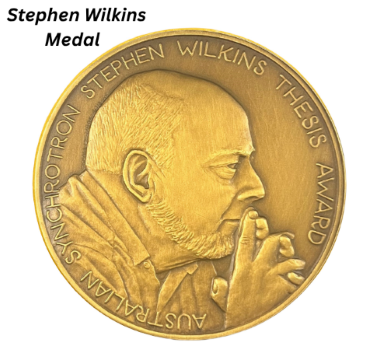Nominations are now open for the ANSTO Australian Synchrotron Stephen Wilkins Thesis Medal.
This medal is awarded annually to the PhD student at an Australian or New Zealand University who is judged to have completed the most outstanding thesis of the past two years whose work was undertaken at and acknowledges ANSTO’s Australian Synchrotron, or whose work acknowledges and was undertaken under the auspices of the International Synchrotron Access Program (ISAP).
Nominations are invited for the 2025 ANSTO Australian Synchrotron Stephen Wilkins Medal, which will be awarded to the candidate producing the most outstanding thesis and whose degree was awarded, but not necessarily conferred, after the 30th June 2023. The awardee will receive a monetary prize of $3,000 funded by a bequest from the Wilkins family and by ANSTO to support career development.
Conditions:
Applicants are able to nominate themselves; however, a letter of support for their application is required from their PhD Supervisor(s).
To be eligible, applicants must have completed their PhD while enrolled at an Australian or New Zealand University and must have been awarded their PhD within 2 years prior to 30 June of the current year. Applicants may still apply if their PhD has been awarded (evidenced by a letter from their university advising they have satisfied the requirements for the degree) but not conferred within this time period.
Nominations are assessed by a Medal Selection Committee appointed by the Director of the Australian Synchrotron.
The award is made to the PhD student at an Australian or New Zealand University who is judged to have completed the most outstanding thesis of the past two years whose work was undertaken at and acknowledges the Australian Synchrotron, or whose work acknowledges and was undertaken under the auspices of the ISAP.
Synchrotron radiation techniques should have made a major contribution to the thesis.
If the Medal Selection Committee is unable to identify a thesis of sufficient quality amongst the applications submitted, an award will not be offered.
If the Medal Selection Committee identifies a number of high quality applications in addition to the Awardee, they may offer a “Highly Commended” certificate.
The Awardee must be available to attend the ANSTO User Meeting to receive their award and present their work in a plenary session.
ANSTO may publicise successful candidates.

